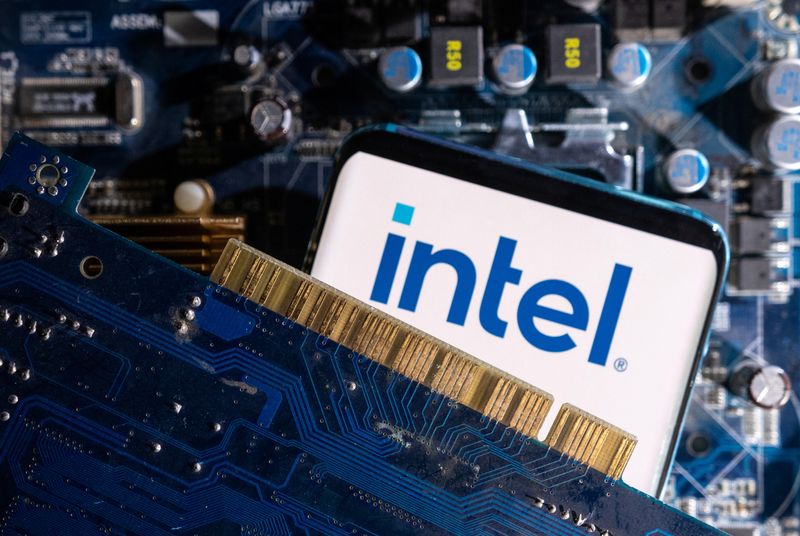By Joyce Lee
SEOUL (Reuters) -From Intel (NASDAQ:INTC) to Samsung (KS:005930), global chipmakers are celebrating the beginning of the end of a semiconductor supply glut, but the outlook for demand from customers outside the artificial intelligence (AI) industry remains gloomy.
All the major markets for chips - smartphones, PCs and data centres - have shrunk this year, as both corporate customers and consumers scale back spending amid a weak global economy, high inflation and rising interest rates.
This has created an unprecedented oversupply of commodity chips, causing a record combined 15.2 trillion won ($12 billion) first-half operating loss for the world's two largest memory chipmakers, Samsung and SK Hynix.
This glut, however, has started to ease largely due to production cuts and as a decline in PC shipments eased to 11% in the June quarter compared to a 30% slump in each of the previous two quarters, data from tech analysts Canalys showed.
The smartphone market is also improving, with cellphone shipments falling 8% in the June quarter, versus 14% in the first quarter, according to research firm Counterpoint.
"Demand is recovering very gradually," Woohyun Kim, chief financial officer at SK Hynix, said on an earnings call this week.
"The recent improvement in PC shipments has been mainly led by promotions and low-end models, meaning it provided limited impact on chip demand recovery," he said, adding that shipment forecasts for PCs and smartphones this year have been downgraded from earlier predictions.
While demand for chips to support generative AI has rapidly increased since OpenAI's ChatGPT was launched late last year, the sector still accounts for a small fraction of overall chip demand and is crimping corporate spending on servers, as some companies prioritize investment in AI.
Intel CEO Pat Gelsinger said on Thursday an inventory glut in server central processing units (CPUs) will persist until the second half of the year and that data centre chip sales will decline modestly in the third quarter before recovering in the fourth quarter. Intel shares rose 6.4% Friday after stronger than expected results.
A sluggish recovery in China, the world's biggest chip buyer, is also dampening the overall outlook.
Both Samsung and SK Hynix said China's reopening failed to live up to expectations that it would revive the smartphone market, and that they were extending production cuts of NAND memory chips, widely used in smartphones to store digital data.
Analog chipmaker Texas Instruments (NASDAQ:TXN), which has heavy exposure to China, forecast third-quarter revenue and profit below Wall Street targets on Tuesday, bogged down by a sluggish recovery in end-market demand that has forced clients to cancel orders. Shares were up 1.5% Friday.
"China was roughly half of sales at the end of fiscal 2022, so China has the largest impact on TI's business," said Logan Purk, analyst at investment firm Edward Jones.
AI WINNERS
Manufacturers of the equipment used to make chips such as KLA Corp and Lam Research (NASDAQ:LRCX) are early winners of the AI boom. Both companies forecast quarterly revenue above Wall Street estimates this week. Shares were up 4.9% and 2.2%, respectively, on Friday.
"Advanced AI servers have significantly higher leading-edge logic, memory and storage content versus traditional servers, and every incremental 1% penetration of AI servers and data centres is expected to drive $1 billion to $1.5 billion of additional (chip equipment) investment," Lam CEO Tim Archer said on a conference call with analysts.
Chipmakers are also increasing production of the high-end chips used to support AI related chips.
SK Hynix said demand for AI server memory had more than doubled in the second quarter compared to the first quarter. Its DRAM chips, which hold information from applications while the system is in use, sold for a higher price in the second quarter versus the first, on average.
The company leads the market in high bandwidth memory (HBM) DRAM used in generative AI. It had a 50% market share in HBM as of 2022, followed by Samsung' 40% and Micron (NASDAQ:MU)'s 10%, according to TrendForce.
($1 = 1,278.7400 won)
